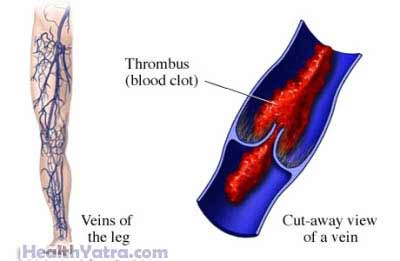Definition
Phlebitis is the term for the swelling of a vein, most often in one’s leg. Thrombophlebitis is the term for inflammation of a vein caused by a blood clot. The term is often shortened to phlebitis. The condition is easily treatable, though it sometimes leads to more serious health concerns.

There are two kinds of phlebitis: superficial phlebitis (affecting veins near the skin’s surface) and deep venous thrombosis (DVT).
When the clot is embedded into a deep vein, thrombophlebitis can become much more serious. The condition, appropriately named deep vein thrombosis, can cause blood clots in the lungs ( pulmonary embolism), heart attack, and stroke.
Causes
Phlebitis is often caused by:
- Prolonged bed rest following an operation
- Paralysis
- Use of estrogen
- Lack of exercising your legs over an extended period of time (eg, long airplane trips)
- Prior episodes of phlebitis
- Trauma to the lower extremity
- Cancer malignancy—Certain cancers may put you at risk for a clotting condition. This condition can lead to venous thrombosis. Cancers such as pancreatic,stomach, prostate, and colon cancer, as well as acute leukemia are known to increase clots.
Risk Factors
A risk factor is something that increases your chance of getting a disease or condition.
The following factors increase your chance of developing phlebitis:
- Sitting for long periods of time, such as on an airplane or being confined to bed rest
- Health conditions that increase the risk of blood clots
- These include cancers particularly of the pancreas which is associated with recurrent phlebitis
- Blood disorders which increase the clotting potential of blood
- These include Protein C deficiency due to Factor V Leiden (hereditary blood coagulation disorder)
- Obesity
- Pregnancy
Symptoms
Symptoms include:
- Very visible, cord-like vein that is tender and sensitive to pressure. This cord may develop over several hours to days.
- Redness and warmth surrounding the vein.
- Swelling around the vein.
- A low-grade fever may be seen, however a high fever and drainage that is purulent (pus) indicate infection.
- Call your physician immediately should you develop a fever, shortness of breath (which may indicate that the clot may have traveled to the lung), and severe pain and swelling in the arm or leg.
Diagnosis
Your doctor will ask about your symptoms and medical history, and perform a physical exam.
Tests may include the following:
- Physical exam
- X-ray or ultrasound to check for deeper blood clots
- Venogram in which dye or contrast is injected
- In case of recurrent episodes of phlebitis, screening for blood disorders is done.
Treatment
Talk with your doctor about the best treatment plan for you. Treatment options include:
- Anti-inflammatory medication—you may be advised to take over-the-counter pain relievers, like aspirin or ibuprofen.
- Exercise—walking is typically recommended.
- Compress—another option is applying a warm compress over the inflamed vein.
- Elevation—elevating the arm or leg with the inflamed vein to a level above the heart may be beneficial.
If you are diagnosed with phlebitis, follow your doctor’s instructions .
Prevention
Phlebitis can sometimes be prevented by the following actions:
- If you fly for long periods of time, walk around the cabin and stretch your limbs every hour or so.
- If you drive for long periods of time, pull over and stretch your limbs ever hour or so.
On flights or car rides lasting more than four hours, take additional precautions to reduce your risk of thrombosis. These include:
- Avoid wearing tight clothing around your waist.
- Drink plenty of fluids to avoid dehydration.
